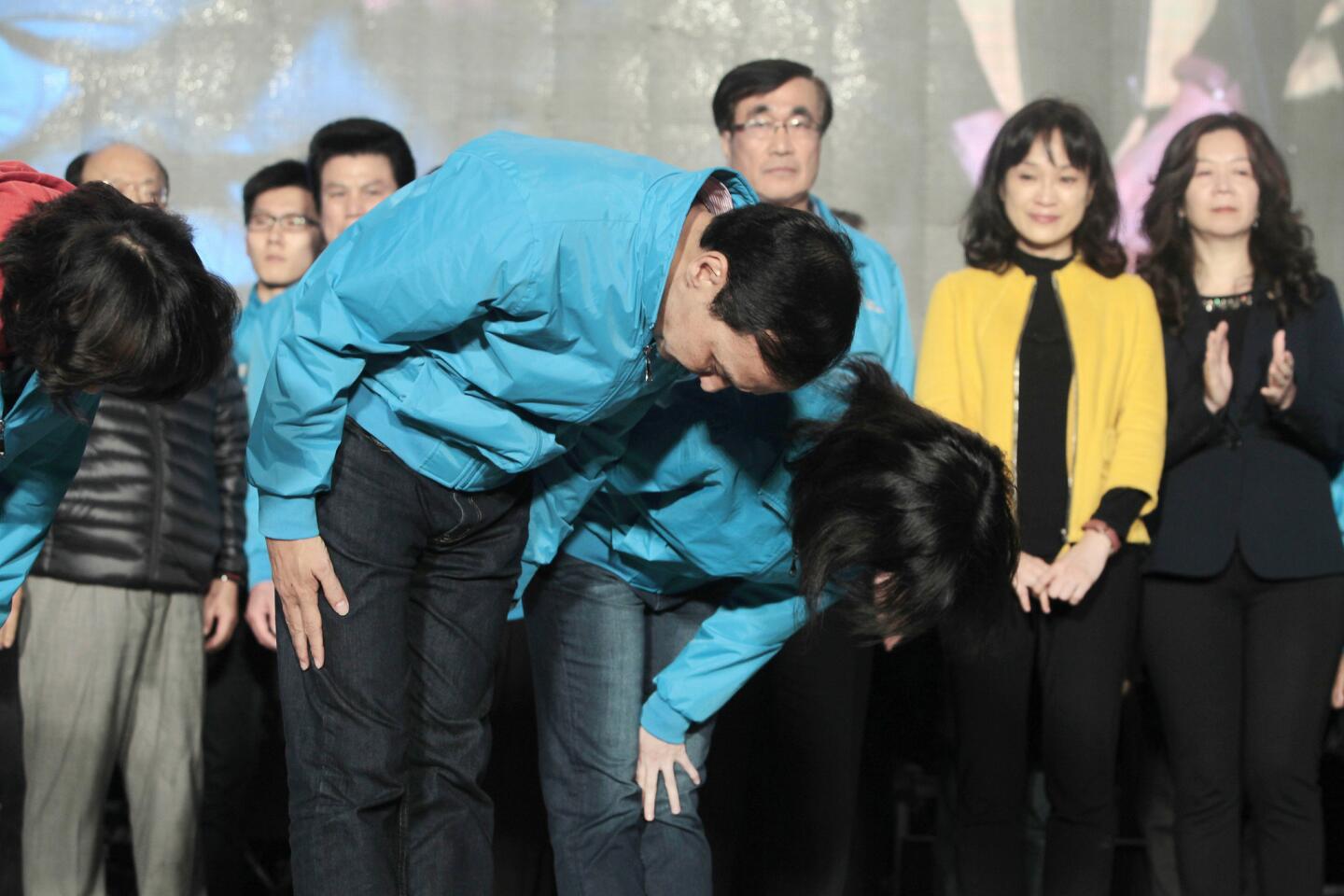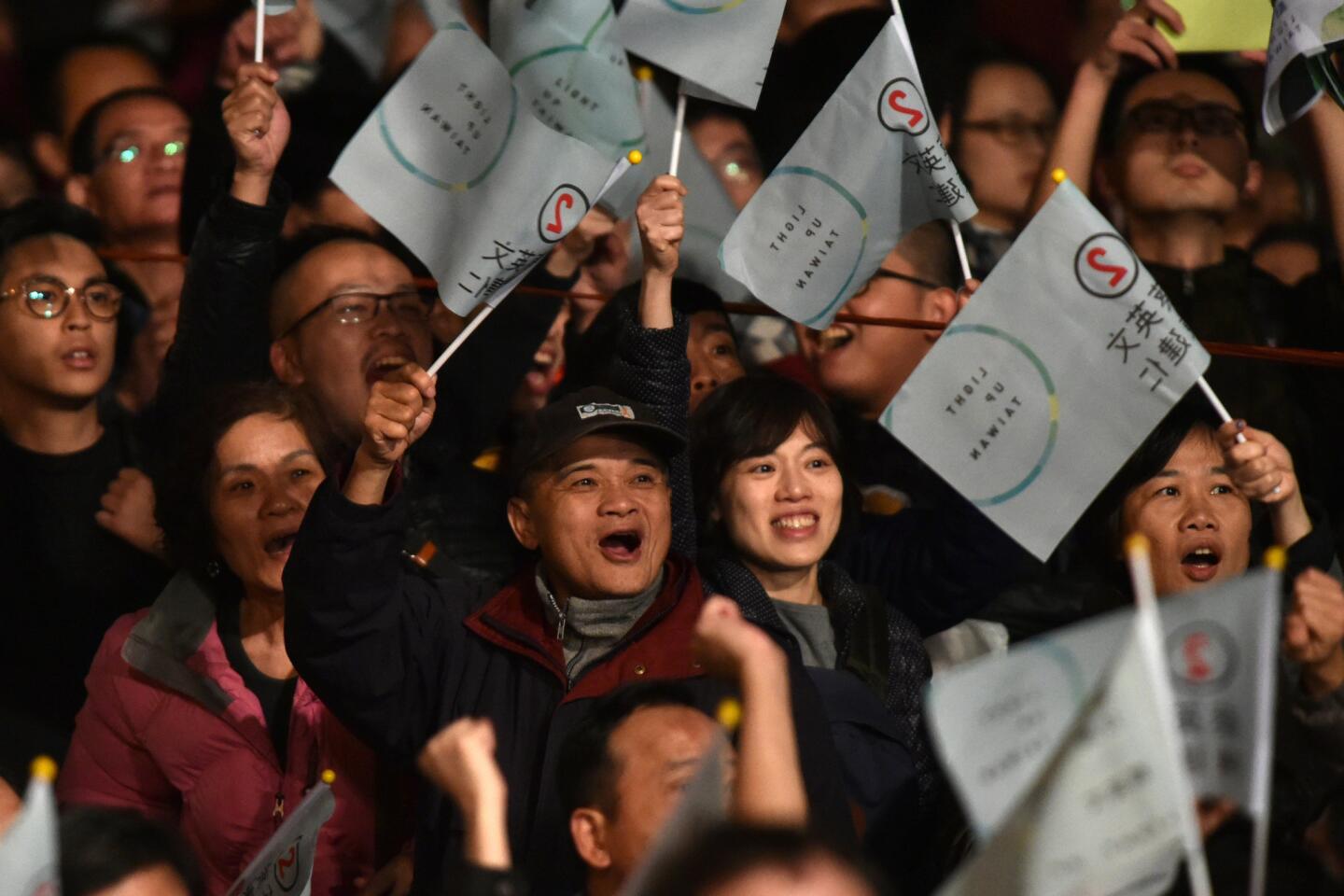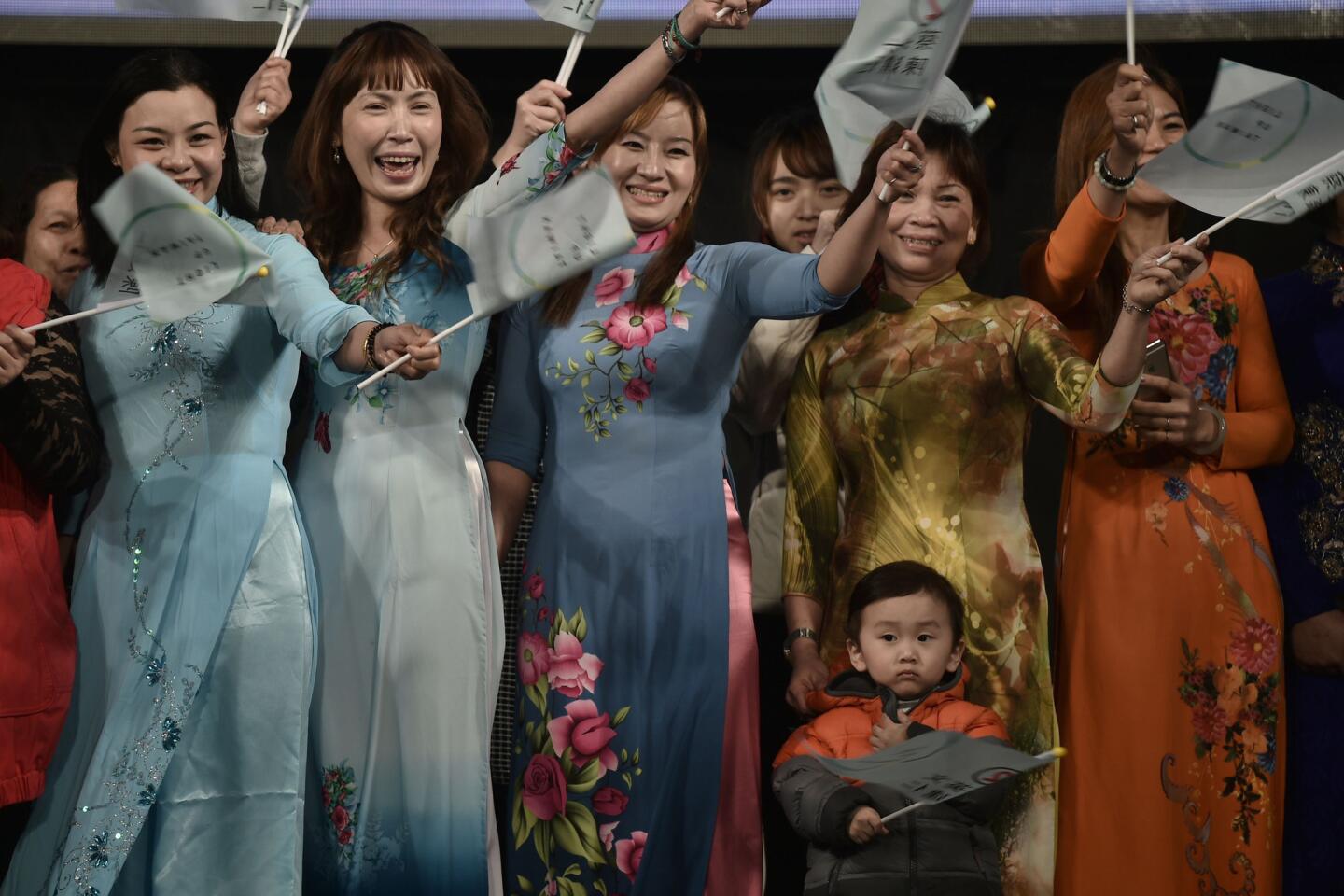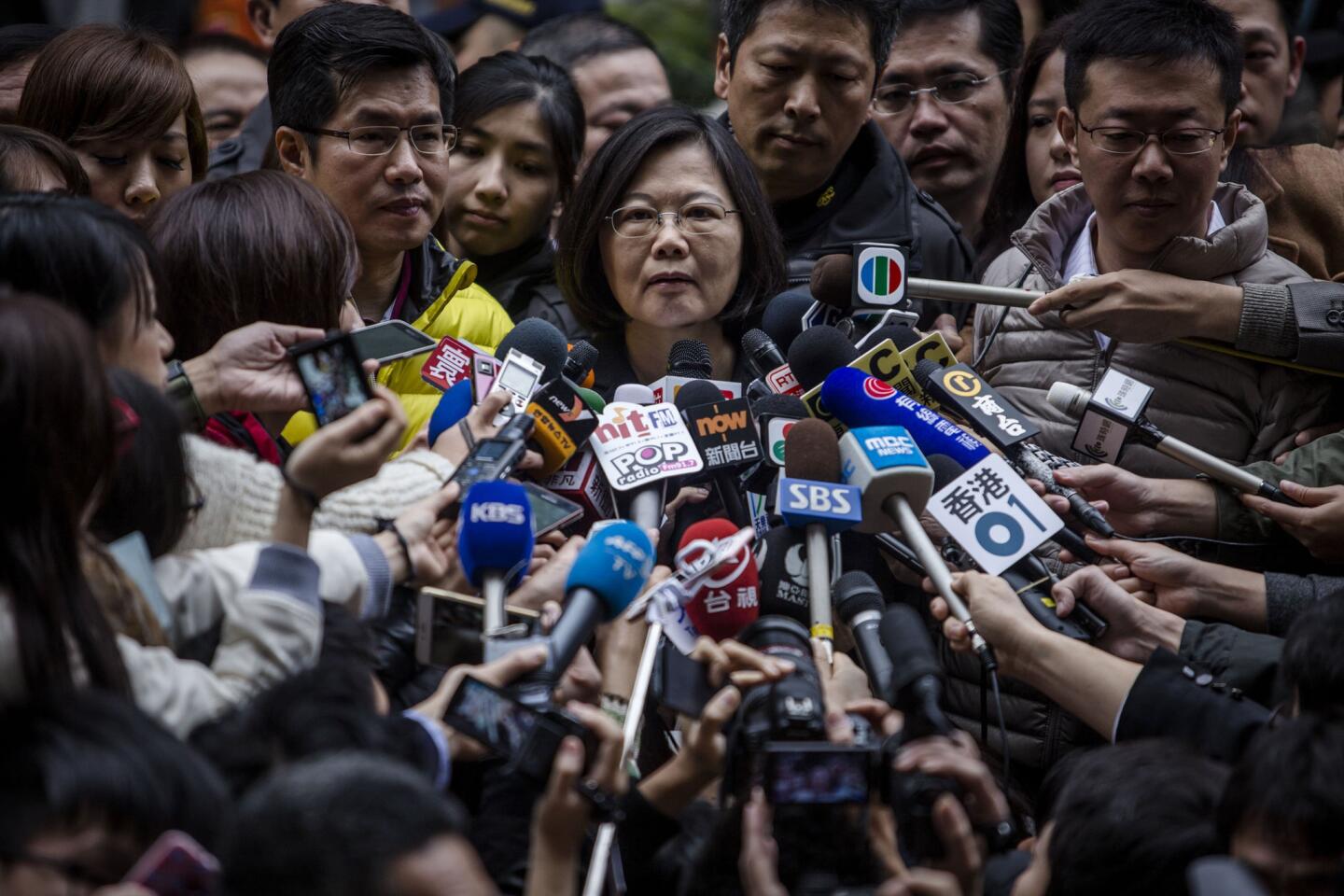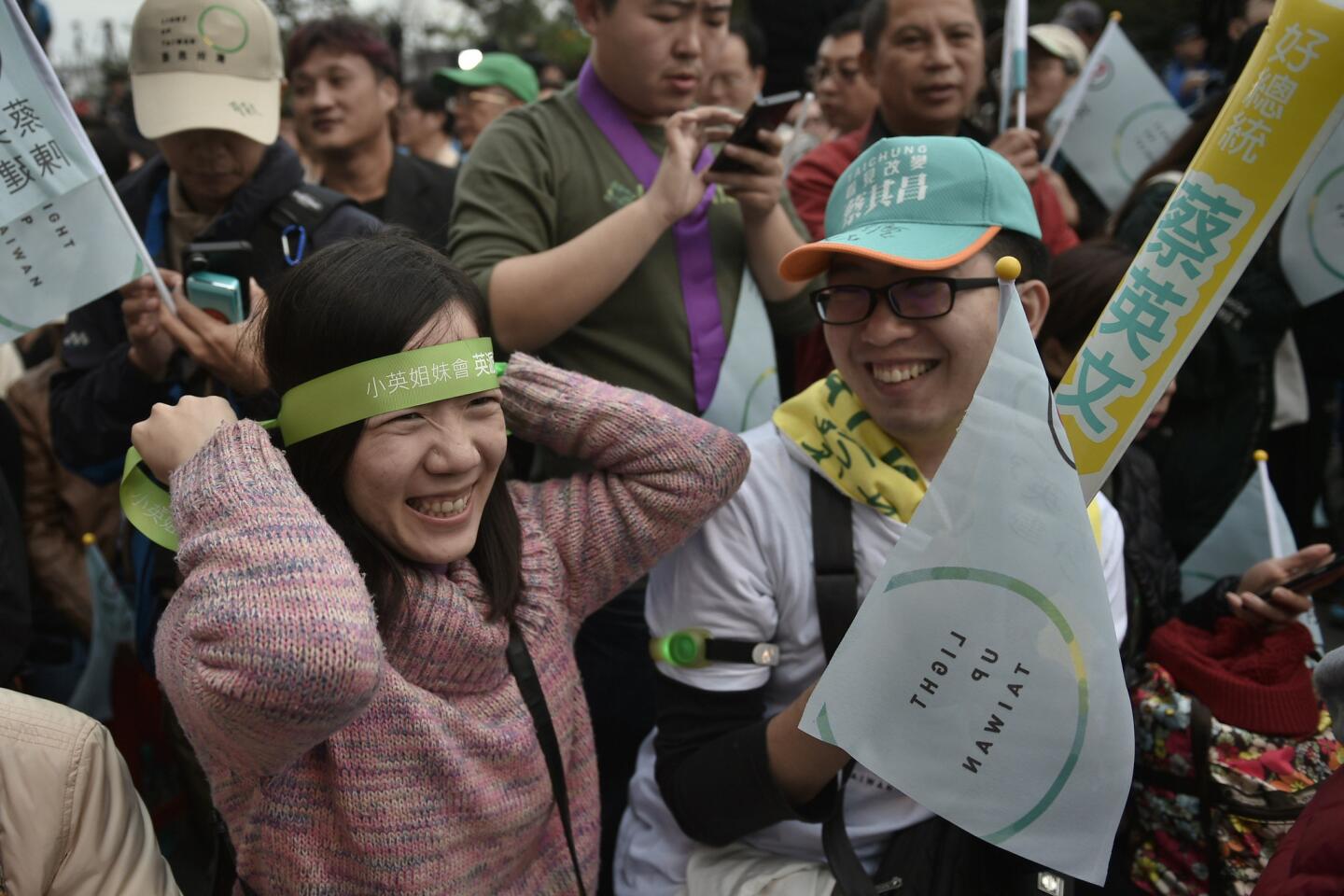Taiwan elects Tsai Ing-wen as first female president
Tsai Ing-wen raises her hands as she declares victory in Taiwan’s presidential election Jan. 16, 2016, in Taipei.
- Share via
Reporting from Taipei, Taiwan — Taiwan elected 59-year-old Tsai Ing-wen of the Democratic Progressive Party as the island’s first female president on Saturday, ousting the Nationalists from the presidential palace after a campaign that hinged on issues of relations with mainland China, the slowing economy, government transparency and social justice.
Promising to end the “old politics of intimidation and confrontation” and usher in a “new era,” Tsai, a lawyer-turned-politician who earned advanced degrees in the United States and England, defeated the Nationalist Party’s Eric Chu with about 60 percent of the vote, with half of the ballots counted. Chu became his party’s candidate only three months before election day, after the Nationalists dumped their initial nominee, Hung Hsiu-chu, who was trailing badly in opinion polls.
The Nationalist Party conceded Saturday evening. Chu appeared three hours after polls closed outside his Taipei party headquarters in his blue “One Taiwan” campaign jacket.
“We failed. The Nationalist Party has lost the elections. We didn’t work hard enough,” he told 400 supporters, making a long bow.
Acknowledging his party had been unable to capture younger voters, he added: “We will start from the grassroots level to build up again. We need to start from the grassroots to foster (the involvement of) younger people.”
The Nationalists also acknowledged that they and their affiliated parties would lose their majority in the 113-member legislature. Among the new lawmakers elected Saturday was heavy metal band singer Freddy Lim, who defeated a Nationalist Party incumbent in central Taipei. Lim is a member of the DPP-aligned New Power Party, formed just last year.
Tsai, who will take office in May, will become only the second member of the DPP to ever serve as Taiwan’s president; her party held the office from 2000 to 2008 under Chen Shui-bian.
The founder of the New Power Party and lead vocalist of the Taiwanese heavy-metal band Chthonic, Freddy Lim, attends a rally in Taipei on Jan. 14, 2016. Lim, whose “black metal” band has been dubbed the Black Sabbath of Asia, won a legislative seat in Taipei City.
The Nationalists’ campaign emphasized stability and largely hinged on defending incumbent Ma Ying-jeou’s pursuit of closer trade and tourism ties with China. Ma, who is termed out after eight years, has argued that his rapprochement with the mainland had boosted the self-ruled island’s economy and reduced tensions with Beijing. The Chinese Communist Party regards Taiwan as a breakaway province that must ultimately be reunited with the mainland, by force if necessary.
On Saturday, China’s official Xinhua news agency said Beijing would not intervene in Taiwan’s election and will focus instead on cross-strait relations. A mainland official urged both sides to be “on high alert against political forces in Taiwan taking advantage of civilian-level exchanges to provoke conflict.”
On the mainland’s Twitter-like service Weibo, searches for Tsai Ing-wen’s name and “Taiwan elections” were blocked Saturday evening as results rolled in.
The Nationalists’ message resonated with voters like 60-year-old Alfa Tsou, who owns a toy factory in Shanghai. “Taiwan’s economy very much depends on mainland tourists. If they did not come, it would have a huge impact on our economy,” said Tsou, who helped organize eight busloads of mostly older people to attend a Chu rally on the eve of the election in New Taipei City. “Taiwan relies very heavily on China economically speaking.”
We failed. The Nationalist Party has lost the elections. We didn’t work hard enough.
— Eric Chu, Nationalist Party candidate
But pointing to stagnant wages, soaring housing prices in Taipei and a stalling economy, many Taiwanese voters said they had yet to see positive impact at the grassroots. DPP voters like Hu Ching-chien, 32, an engineer for a hi-tech company in Hsinchu said they feared becoming too tightly leashed to the mainland — whose economy itself is slowing — and worried about Beijing using trade ties to exert political pressure on Taiwan. The island began holding direct, democratic presidential elections in the 1990s after decades of one-party rule by the Nationalists.
“Taiwan’s autonomy is the most important issue,” said Hu, who cast his presidential ballot for Tsai.
“I am very happy. I feel I have finally accomplished something for Taiwan, so that Taiwan will have great autonomy instead of just following China,” he added. Although he said he was afraid Tsai’s election might mean greater instability for the island, it’s a risk he said Taiwan must take.
“If there was no change, Taiwan would become just part of China.”
To what extent Tsai will be willing or able to continue Ma-style engagement with authorities in Beijing — and how Communist Party leaders will respond to her election — is one of the big question marks hanging over Tsai’s “new era.” China’s state-run media has in the past denounced Tsai as a “troublemaker” and warned that her election could plunge cross-Strait relations into ruin, though in recent months, as polls showed a Tsai victory increasingly likely, Beijing seems to have moderated some of that rhetoric.
In November, Ma held direct talks with Chinese President Xi Jinping in Singapore. While little of substance emerged, the encounter marked the first time since the end of China’s civil war in 1949 that leaders of the two sides have met.
The DPP has long had a more pro-independence ethos, adding to the party’s appeal among young voters. Opinion surveys show a large majority of the island’s citizens under 30 regard themselves as Taiwanese, and not Chinese, though polls also show that a large number of Taiwanese support maintaining the island’s murky “status quo” for the time being. Taiwan is not a member of the United Nations, and has formal diplomatic relations with fewer than two dozen countries because of Beijing’s insistence that there is only “one China.”
Outside the DPP headquarters on Saturday night, supporters had erected a large sign reading: “Taiwan is NOT part of China! Support Taiwan independence.” During the campaign, Tsai carefully calibrated her comments on Taiwan’s political status, saying that she is committed to a “consistent, predictable, and sustainable relationship with China” even while robustly defending Taiwanese autonomy and democracy.
The issue of cross-Strait relations is of particular concern to Washington, which sells weapons to Taiwan and has committed to come to its aid in the event of an attack from the mainland.
“We are entering new territory, because Tsai Ing-wen is the head of the Democratic Progressive Party, which Beijing views as committed to Taiwan independence, and there is at least the danger that Beijing would pre-judge her,” said Richard C. Bush, director of the Center for East Asia Policy Studies at the Brookings Institution in Washington. “And if she does not accommodate to Beijing in the way Beijing would like, then it takes actions to punish Taiwan in a way that would just get people in Taiwan riled up, so you have the danger of a downward spiral.”
“Frankly, it’s pretty hard to know what’s going to happen because both Xi Jinping and Tsai Ing-wen are guarded in what they say about future policies,” Bush added.
The DPP ran a disciplined campaign that appealed in particular to younger Taiwanese who in the last few years have become active in social movements and political protests.
In the spring of 2014, student-led activists occupied Taiwan’s parliament in protest over what they regarded as a move by Ma and the Nationalist-controlled legislature to pass a trade pact with mainland China without sufficient discussion.
This election, Tsai told supporters Friday night at a rally in front of the presidential palace, would “release civil society’s power, adding that “the DPP is part of this force.”
While Tsai sought to keep the focus of the campaign on “domestic” issues, relations with mainland China were never far from the fore.
They bubbled up again on the eve of the election, when a 16-year-old Taiwanese singer, who performs with a South Korean girl group called Twice, came under heavy criticism from some figures on the mainland for waving a Republic of China flag, which is used in Taiwan, on a TV show in November. Her detractors claimed the move showed her support for Taiwanese independence.
In a video released overnight, Chou Tzu-yu issued an apology, reading from a script. “There’s only one China. The two sides of the strait belong to one unified entity,” she said. “I’ve always been proud to be Chinese.”
The incident infuriated many Taiwanese, some of whom likened the recording to a hostage video. Tsai, Chu and Ma’s administration all issued statements in support of Chou, saying she had nothing to apologize for.
“Citizens carrying flags to express national love and and recognition is a natural act,” said the Taiwanese government’s Mainland Affairs Council. The agency added it had contacted its counterparts on the mainland “to express our point of view. This matter has already caused a severe wound to Taiwan people’s feelings.”
“We hope mainland China takes the correct view on this matter and urges the mainland side to put the brakes on this sort of matter.” Added Ma in a personal statement: “I hereby would like to tell Miss Chou that she need not apologize. We support her!”
Tsai addressed the controversy after she voted Saturday morning. “I believe everyone feels hurt and angry to see that Chou was forced to do what she was made to do,” she told reporters. “This has offended and hurt the feelings of the people of Taiwan. Everyone should unite to voice their belief to the world that no national of the Republic of China should be [attacked] for identifying with her country.”
Special correspondent Ralph Jennings in Taipei contributed to this report.
Follow @JulieMakLAT for news from China
More to Read
Sign up for Essential California
The most important California stories and recommendations in your inbox every morning.
You may occasionally receive promotional content from the Los Angeles Times.

